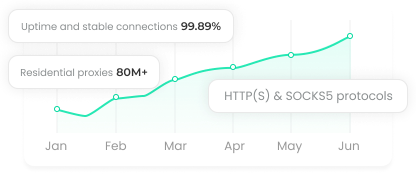The Role of User Agents for Web Scraping

About 70% of web scrapers fail due to poor user agent management, revealing a harsh truth that mastering user agents is no longer optional but essential. Although user agents may seem like just a simple string of text, they hold the key to smooth and consistent scraping, helping you avoid endless CAPTCHAs and blocks.
What Exactly Is a User Agent
Think of a user agent as your scraper's ID badge. It's a snippet of data sent with every web request, telling the server who you are — what browser, device, and OS you're pretending to be. Servers use this to decide which version of a site to send back.
Simple? Sure. But its impact is massive.
Why Do User Agents Matter to Websites
Websites use user agents for several crucial reasons:
Optimizing Content Delivery: Different devices need different layouts. A mobile user agent triggers mobile-friendly pages; a desktop agent fetches the full experience.
Analytics & Insights: They track which browsers and devices are popular to improve user experience.
Security & Access Control: Known bad bots get flagged and blocked based on their user agent strings.
Feature Compatibility: Some browsers don't support all features. Websites adapt accordingly, often loading fallback scripts if needed.
Why Are User Agents Critical in Web Scraping
Scrapers face a challenge because websites are built to detect and block bots. That's where savvy user agent management becomes a game-changer.
Content Negotiation: Get the right version of the page by mimicking the appropriate device or browser.
Avoid Detection: Use realistic, rotating user agents to fly under the radar and dodge blocks or CAPTCHAs.
Respect Terms of Service: Legitimate user agents help reduce legal risk by blending in with regular traffic.
Testing & Validation: Simulate multiple devices to see how content varies, ensuring your scraper captures everything needed.
How Do Websites Detect User Agents
When your scraper sends a request, the server reads the User-Agent header. It then decides:
Which content version to serve (mobile? desktop? generic?)
Whether to allow or deny access
If it should apply rate limits or block suspicious behavior
Here's a quick peek at how servers check user agents in Python, using Flask:
from flask import Flask, request, jsonify
app = Flask(__name__)
blocked_agents = ['BadBot/1.0', 'Mozilla/5.0 (compatible; Googlebot/2.1; +http://www.google.com/bot.html)']
@app.route('/')
def check_user_agent():
ua = request.headers.get('User-Agent', '')
print(f"User-Agent: {ua}")
if ua in blocked_agents:
return jsonify({"message": "Access Denied"}), 403
if 'Mobile' in ua or 'Android' in ua:
return jsonify({"message": "Mobile Content"}), 200
elif 'Windows' in ua or 'Macintosh' in ua:
return jsonify({"message": "Desktop Content"}), 200
else:
return jsonify({"message": "Generic Content"}), 200
if __name__ == '__main__':
app.run(debug=True)
How to Change Your User Agent for Scraping
Changing your user agent is easy — and essential. It tells servers you're a different browser or device, helping you avoid blocks. Here's a quick Python example using the requests library:
import requests
url = 'https://example.com'
headers = {
'User-Agent': 'Mozilla/5.0 (Windows NT 10.0; Win64; x64) AppleWebKit/537.36 (KHTML, like Gecko) Chrome/91.0.4472.124 Safari/537.36'
}
response = requests.get(url, headers=headers)
print(response.content)
Common User Agents to Keep in Your Toolkit
Here are some reliable user agents that mimic popular browsers and devices:
Chrome Desktop (Windows 10):
Mozilla/5.0 (Windows NT 10.0; Win64; x64) AppleWebKit/537.36 (KHTML, like Gecko) Chrome/91.0.4472.124 Safari/537.36
Chrome Mobile (Android):
Mozilla/5.0 (Linux; Android 10; SM-G975F) AppleWebKit/537.36 (KHTML, like Gecko) Chrome/91.0.4472.124 Mobile Safari/537.36
Firefox Desktop (Windows 10):
Mozilla/5.0 (Windows NT 10.0; Win64; x64; rv:89.0) Gecko/20100101 Firefox/89.0
Safari Desktop (macOS):
Mozilla/5.0 (Macintosh; Intel Mac OS X 10_15_7) AppleWebKit/605.1.15 (KHTML, like Gecko) Version/14.0.3 Safari/605.1.15
Googlebot (Google's crawler):
Mozilla/5.0 (compatible; Googlebot/2.1; +http://www.google.com/bot.html)
Pro Tips to Avoid Getting Your User Agent Banned
Rotate User Agents
Keep your scraper's fingerprint fresh by cycling through different user agents. This randomness makes it tougher for websites to catch patterns and block you.
import requests
from random import choice
user_agents = [
'Mozilla/5.0 (Windows NT 10.0; Win64; x64)...',
'Mozilla/5.0 (Macintosh; Intel Mac OS X 10_15_7)...',
'Mozilla/5.0 (iPhone; CPU iPhone OS 14_6 like Mac OS X)...',
# Add more user agents here
]
def fetch_with_random_ua(url):
ua = choice(user_agents)
headers = {'User-Agent': ua}
response = requests.get(url, headers=headers)
print(f"Used User-Agent: {ua} | Status: {response.status_code}")
return response.content
Add Random Delays Between Requests
Automated scrapers rarely hit websites with perfectly timed requests. Mimic human browsing by pausing unpredictably between calls.
import time
import random
delay = random.uniform(1, 5) # Sleep between 1 and 5 seconds
time.sleep(delay)
Keep User Agents Up-to-Date
Old user agents scream "bot." Use current browser versions to blend in and avoid blacklists.
Customize User Agents When Needed
Craft your own user agents with extra metadata to throw off simple filters and add complexity.
Wrapping Up
User agents for web scraping are more than simple strings. When you master their use, you can avoid blocks, lower the number of CAPTCHAs, and scrape more efficiently. The secret lies in rotating them regularly, keeping them up to date, and adding randomness to your scraping patterns. That's where the true power comes in.
關於作者

About 70% of web scrapers fail due to poor user agent management, revealing a harsh truth that mastering user agents is no longer optional but essential. Although user agents may seem like just a simple string of text, they hold the key to smooth and consistent scraping, helping you avoid endless CAPTCHAs and blocks.
What Exactly Is a User Agent
Think of a user agent as your scraper's ID badge. It's a snippet of data sent with every web request, telling the server who you are — what browser, device, and OS you're pretending to be. Servers use this to decide which version of a site to send back.
Simple? Sure. But its impact is massive.
Why Do User Agents Matter to Websites
Websites use user agents for several crucial reasons:
Optimizing Content Delivery: Different devices need different layouts. A mobile user agent triggers mobile-friendly pages; a desktop agent fetches the full experience.
Analytics & Insights: They track which browsers and devices are popular to improve user experience.
Security & Access Control: Known bad bots get flagged and blocked based on their user agent strings.
Feature Compatibility: Some browsers don't support all features. Websites adapt accordingly, often loading fallback scripts if needed.
Why Are User Agents Critical in Web Scraping
Scrapers face a challenge because websites are built to detect and block bots. That's where savvy user agent management becomes a game-changer.
Content Negotiation: Get the right version of the page by mimicking the appropriate device or browser.
Avoid Detection: Use realistic, rotating user agents to fly under the radar and dodge blocks or CAPTCHAs.
Respect Terms of Service: Legitimate user agents help reduce legal risk by blending in with regular traffic.
Testing & Validation: Simulate multiple devices to see how content varies, ensuring your scraper captures everything needed.
How Do Websites Detect User Agents
When your scraper sends a request, the server reads the User-Agent header. It then decides:
Which content version to serve (mobile? desktop? generic?)
Whether to allow or deny access
If it should apply rate limits or block suspicious behavior
Here's a quick peek at how servers check user agents in Python, using Flask:
from flask import Flask, request, jsonify
app = Flask(__name__)
blocked_agents = ['BadBot/1.0', 'Mozilla/5.0 (compatible; Googlebot/2.1; +http://www.google.com/bot.html)']
@app.route('/')
def check_user_agent():
ua = request.headers.get('User-Agent', '')
print(f"User-Agent: {ua}")
if ua in blocked_agents:
return jsonify({"message": "Access Denied"}), 403
if 'Mobile' in ua or 'Android' in ua:
return jsonify({"message": "Mobile Content"}), 200
elif 'Windows' in ua or 'Macintosh' in ua:
return jsonify({"message": "Desktop Content"}), 200
else:
return jsonify({"message": "Generic Content"}), 200
if __name__ == '__main__':
app.run(debug=True)
How to Change Your User Agent for Scraping
Changing your user agent is easy — and essential. It tells servers you're a different browser or device, helping you avoid blocks. Here's a quick Python example using the requests library:
import requests
url = 'https://example.com'
headers = {
'User-Agent': 'Mozilla/5.0 (Windows NT 10.0; Win64; x64) AppleWebKit/537.36 (KHTML, like Gecko) Chrome/91.0.4472.124 Safari/537.36'
}
response = requests.get(url, headers=headers)
print(response.content)
Common User Agents to Keep in Your Toolkit
Here are some reliable user agents that mimic popular browsers and devices:
Chrome Desktop (Windows 10):
Mozilla/5.0 (Windows NT 10.0; Win64; x64) AppleWebKit/537.36 (KHTML, like Gecko) Chrome/91.0.4472.124 Safari/537.36
Chrome Mobile (Android):
Mozilla/5.0 (Linux; Android 10; SM-G975F) AppleWebKit/537.36 (KHTML, like Gecko) Chrome/91.0.4472.124 Mobile Safari/537.36
Firefox Desktop (Windows 10):
Mozilla/5.0 (Windows NT 10.0; Win64; x64; rv:89.0) Gecko/20100101 Firefox/89.0
Safari Desktop (macOS):
Mozilla/5.0 (Macintosh; Intel Mac OS X 10_15_7) AppleWebKit/605.1.15 (KHTML, like Gecko) Version/14.0.3 Safari/605.1.15
Googlebot (Google's crawler):
Mozilla/5.0 (compatible; Googlebot/2.1; +http://www.google.com/bot.html)
Pro Tips to Avoid Getting Your User Agent Banned
Rotate User Agents
Keep your scraper's fingerprint fresh by cycling through different user agents. This randomness makes it tougher for websites to catch patterns and block you.
import requests
from random import choice
user_agents = [
'Mozilla/5.0 (Windows NT 10.0; Win64; x64)...',
'Mozilla/5.0 (Macintosh; Intel Mac OS X 10_15_7)...',
'Mozilla/5.0 (iPhone; CPU iPhone OS 14_6 like Mac OS X)...',
# Add more user agents here
]
def fetch_with_random_ua(url):
ua = choice(user_agents)
headers = {'User-Agent': ua}
response = requests.get(url, headers=headers)
print(f"Used User-Agent: {ua} | Status: {response.status_code}")
return response.content
Add Random Delays Between Requests
Automated scrapers rarely hit websites with perfectly timed requests. Mimic human browsing by pausing unpredictably between calls.
import time
import random
delay = random.uniform(1, 5) # Sleep between 1 and 5 seconds
time.sleep(delay)
Keep User Agents Up-to-Date
Old user agents scream "bot." Use current browser versions to blend in and avoid blacklists.
Customize User Agents When Needed
Craft your own user agents with extra metadata to throw off simple filters and add complexity.
Wrapping Up
User agents for web scraping are more than simple strings. When you master their use, you can avoid blocks, lower the number of CAPTCHAs, and scrape more efficiently. The secret lies in rotating them regularly, keeping them up to date, and adding randomness to your scraping patterns. That's where the true power comes in.


















































